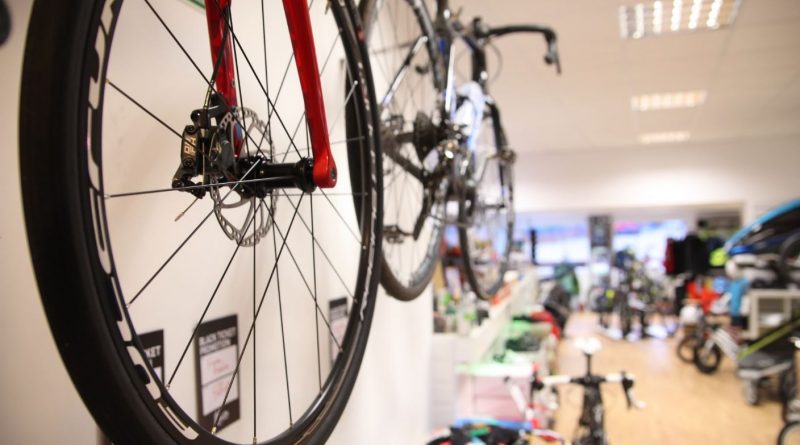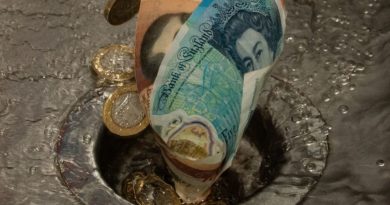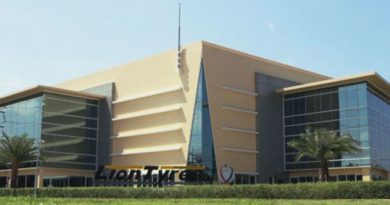Comment: The brutal truths and what bike shops can do about them!
By Jay Townley of the Gluskin Townley Group
On April 14, 2016 Jerry Stritzke, the CEO of REI challenged the American bicycle industry at the Bicycle Leadership Conference by asking: “Who in the bicycle industry is going to talk about the brutal truths?”
We think it’s time to start the discussion about the Brutal Truths, what bike shops can do about them and invite you to join us!
Before starting I would like to point out that this is just the beginning of an ongoing discussion of the brutal truths about the American bicycle business and is the first in another series of CyclingIndustry.News articles and Gluskin Townley Group webinars and podcasts about this ripe and vitally important subject.
We will focus on what bike shops can do about the brutal truths, but if you have any questions about the history, research or factual data supporting any of the” truths” or our opinions about them let us know!
What Bike Shops Can Do About…The Black Hole of Bike Shop Profitability[1]!
Bike shops have been doing a good job of reducing operating costs, but the typical American bike shop still isn’t making a profit on the sale of new bicycles. Efficient operating costs are essential to good business management, but the biggest cost is payroll and there is a real danger in cutting too deep because bike shops need good employees both outward-facing and in the shop.
Preserve and nurture the soul of your bike shop, your employees. Good wrenches can be hard to come by and are valued, but bike shops need to place a great deal more value on employing, training and education customer service professionals. These staff can become hardwired to serve and enjoy crafting lifestyle solutions for customers and capturing them for your bike shop for life!
It is human contact with bike shop employees that is the great differentiator from online retailers and this human touch will become a rare and precious attribute that will be increasingly valued by American consumers!
The economic tightrope for bike shops is being able to pay and provide the benefits for the soul of their business. A great staff, while first making new bicycles a profitable merchandise category, can follow up by introducing and implementing new consumer focused experiential and lifestyle profit streams to grow revenue and overall profitability. 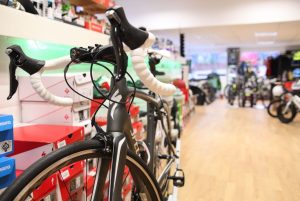
Start by reviewing all Authorized Dealer Agreements and their contribution to your bike shops profitability. Seriously consider terminating any contractual relationship that doesn’t meet the profit needs of your business.
Next, look at bicycle brands that offer your bike shop real profitability on the sale of new bicycles. There are currently over 140 bike brands available to American bike shops and not all of them have restrictive or unreasonable Authorized Dealer Agreements. Furthermore, some of them offer MSRP and suggest retail pricing structures that generate profitability for bike shops on the sale of new bikes.
As a part of your review, evaluate locally-made bicycles that don’t bind your business to the old economic paradigms of bike shop retailing. More American bike shops have added bike brands made in their region – or have actually started fabricating their own brand of bicycles – just like the Wright Brothers did – to either augment their other lines of bicycles or as their primary new bicycle product offering.
Individually-customized [and I don’t mean custom] bicycles – that allow you to use off-the shelf components to craft individual bicycles for individual bicycling lifestyles are a close, but separate category, that has also been gaining momentum among American bike shops.
Remember, your shop is the brand! It always has been and your customers honor you with their purchases because they trust you and your bike shop’s brand. There are certainly issues like insurance and compliance with the U.S. CPSC bicycle safety regulations, but new-wave, outlier bike shops and locally-made bicycle brands have been able to overcome these bumps – and so can you!
On July 21, 2016 Columbus Business First published the following article by Dan Eaton, staff reporter: Bicycle retailer Roll turns to building its’ own bikes.
Stuart Hunter remains excited about his bicycle business, but is skeptical about his industry’s future.
He owns Roll, a bicycle and accessories retailer with three Central Ohio stores and a shop in Chicago. It is one of around 4,000 independent bike retailers in the U.S. — a figure Hunter expects to be reduced by as much as 25 percent in the next five years.
“We’re an industry run by enthusiasts for enthusiasts,” he said. “We have a passion for biking, but not necessarily a passion for retail.”
Hunter, who spent 12 years with retail consultants, including Fitch and RPA, before launching Roll 10 years ago, has a passion for both. Unfortunately his outlook is grim.
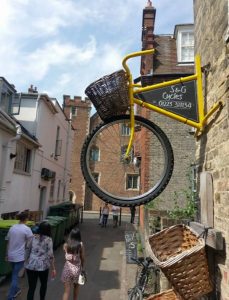 Industry sales aren’t growing and the top four or five manufacturers are locked in a shifting battle for share, he said. Manufacturers don’t allow independent retailers to sell bikes online, but those same manufacturers are going into direct online sales themselves.
Industry sales aren’t growing and the top four or five manufacturers are locked in a shifting battle for share, he said. Manufacturers don’t allow independent retailers to sell bikes online, but those same manufacturers are going into direct online sales themselves.
“We need to take control of our own brand and our own products,” he says.
His solution is to become a manufacturer himself.
Hunter is launching Roll Bicycle Co. with a party Thursday night, a Kickstarter campaign hoping to raise $40,000 and plans to be selling Columbus-assembled bicycles to customers by November.
Changing habits
“Our customers have changed,” Hunter said. “Their shopping habits change. They interact with brands differently and our industry has struggled to keep up. It’s being shaped by other channels. You can customize your coffee, your car. You can buy online. Customers want that.”
Roll Bicycle’s 1:Bike will have a single frame that can be built into three different styles of bikes — sport, city or adventure — and from there it can be customized in a number of other ways, including a selection of six different colors. The ride is then tailored to each individual using the store’s perfect fit scanning technology. The turnaround time is 48 hours between order and pickup. The price is $700.
“Sourced globally, assembled locally,” Stuart Hunter said.
Contact jay@glsukintownleygroup.com for a copy of the complete July 21, 2016 Columbus Business First article.
What bike shops can do about bicycles and bicycling losing relevance with american consumers!
While bicycles and bicycling are losing their relevance on a national basis, individual local bike shops can do something about awareness and relevance by becoming the bicycling “expert” in their neighborhood and community.
Most bike shops don’t conduct marketing outreach because they believe the cost is prohibitive and there is the very real issue of band width, including owners and employees having the time to do effective marketing.
The kind of effective marketing outreach we are recommending is low cost, but it does take dedicated time to promote through local media and social media. First, contact your local newspaper, radio and TV station or stations – and offer to help with or contribute to an “expert” bicycle and/or bicycling feature.
Hold regularly scheduled and promoted events to demonstrate all the forms of bicycling your customer base is interested in discovering and finding out more about.
Join the National Bicycle Dealers Association – and agitate and demand that the Association develop a campaign that bike shops can implement locally to promote bicycles and bicycling in their neighborhood and local marketing space!
What bike shops can do about flat sales of new bicycles in the U.S.?
Start by sitting down and examine your bike shops strategy. If “exclusivity” works for you – so be it!
If you want a real profitable business for you, your employees and your family, open your strategy to embrace a differentiated inclusive retail business model that welcomes everyone to enjoy bicycles and bicycling at your shop. 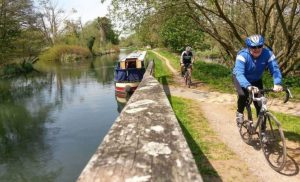
And – diversify your offerings to include experiential products and services. What do we mean by embracing experiential retailing? The global research company NPD recently found – somewhat to its surprise – that: People shop for the experience!
Brick-and-mortar retailers, including bike shops have a counter to the power of Amazon… it’s American consumers’ interest in buying memories!
When NPD began examining the phenomenon of experiential purchasing – in which a retailer offers consumers a chance to buy an experience rather than just an object or service — they were “fascinated” to see just how widespread the approach has become in retailing in America.
From cooking classes at Whole Foods, to fitness classes at Macy’s and Lululemon, to outdoor education through REI and Cabela, it’s clear people go to stores to do something more than just shop.
Bike shops can differentiate themselves and develop closer emotional and experiential relationships with their customers’ by offering and promoting:
- Slow Rides & Neighborhood & Block bike events
- Bicycle Trips & Tours
- Bicycle Rentals & Rent to Buy & Leasing
- Clinics and Classes for new and returning bicyclists of all ages
- Training & Physical Fitness Classes and Rides
- Trade-Ins
What bike shops can do about 55 percent of the adults who visit a bike shop purchasing from another channel of trade!
Learn from new wave bike shops and how they have embraced the “holy grail of retailing” – making competition irrelevant and in so doing creating uncontested market space and generating increased intercept, conversions and close rates.
You can learn more about the holy grail of retailing by reading the Blue Ocean Strategy – a book we highly recommend to bike shop owners that was recommended to us by a bike shop owner!
New wave bike shops and the outliers understand that making competition irrelevant and creating uncontested market space is about developing a specialty bike shop retail concept that is so welcoming, friendly and compelling that it completely differentiates – and generates high revenue and profit opportunities!
We also recommend that bike shop owners contact The League of American Bicyclists and get a copy of Bike Shops For Everyone!
Here is what Bike Shops For Everyone recommends to help American bike shops convert more of the adults who visits and turn them to customers for life:
“Bike shops are essential to a thriving bicycle-friendly America. Equipping shops with the tools to expand their customer base and encourage more women and other underrepresented groups to ride is key to their long-term viability and success.
“While some shops have wholeheartedly embraced the challenge, others have yet to understand the immediacy of making the shift to more inclusive strategies. The aloofness and at times cryptic service that people often experience at bike shops is quite literally turning people away at the door. It’s time to re-imagine what a great customer experience looks like at a bike shop, and set the bar much higher.
“The strategy is simple: Being courteous, attentive and responsive to customers’ needs.”
We have offered suggestions about what bike shops can do to overcome four of The Brutal Truths that burden and restrict them and in the process increase revenue and profitability – and we would like to hear from you about both the Truths and our suggestions by emailing jay@gluskintownleygroup.com.
[1] The Black Hole of Bike Shop Profitability was first used by Fred Clements, vice president of the National Bicycle Dealers Association as the title for a blog post that appeared July 29, 2014
